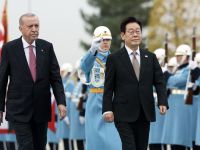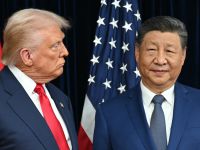Opposition forces entered the Afghan capital Kabul Tuesday after chasing out the ruling Taliban militia to score their biggest victory in a stunning weeklong offensive.
But as an advance guard of opposition security forces fanned out across the city, fears grew that the US-backed military campaign may have moved too far ahead of political plans for the creation of a new broad-based government to end more than 20 years of war in Afghanistan.
An AFP reporter saw 50 or 60 troops of the Northern Alliance, with their distinctive pakool caps, entering the city from the north in jeeps and four-by-four vehicles after the Taliban staged an overnight evacuation.
They were armed with kalashnikov rifles and rocket-propelled grenade launchers. No Taliban fighters were sighted in the city except for a group of four escorted by opposition soldiers.
Small crowds of Kabul residents lined the streets in the north of the city to cheer the arrival of the Northern Alliance forces. They chanted "Allah o Akhbar (God is Great)" as the opposition troops shouted the same greeting.
"They have already arrived. They have already arrived," exulted Mohammed Ajmal, a resident in the north of Kabul. "The Taliban have gone. The Taliban have gone."
Local men were seen without the turbans required by the Islamic regime in a sign that the Taliban's hardline influence had vanished almost as quickly as it was imposed after the Islamic militia's 1996 takeover of the city.
But the city remained tense with fears that the ethnic factions of the Northern Alliance -- responsible for widespread devastation and infighting here during the 1994-96 mujahedin government -- might resort to looting or turn on each other as they have in the past.
"If the opposition forces are able to keep security and ethnic differences do not emerge among them then I will be very happy to see them back in Kabul because the Taliban were a tyrannical regime," said resident Abdul Gafoor, 58.
"But if the opposition forces repeat the atrocities of six years earlier that will be a tragedy for Afghanistan and especially for Kabul."
Commander Gul Haider told AFP that none of the opposition's main force troops had been sent into Kabul in a sign that US requests for a halt at the city's gates may be respected.
"We have not allowed our mujahedin to enter the city. We have only sent police forces," Haider said from the mountains outside Kabul.
"There will be no disorder. The police force is there to give security and irresponsible people should not exploit the situation."
Sporadic gunfire echoed through some parts of Kabul where hardline Arab supporters of the Taliban were believed to be hiding. Looting was seen at the vacant Pakistani embassy, at a main money exchange and a nearby market.
Washington had been urging the Northern Alliance to surround but not enter Kabul to allow time for the constitution of a government acceptable to the dominant Pashtuns ethnic group, the Taliban's power base.
But US officials acknowledged they had "no control" over the opposition push and UN Secretary General Kofi Annan stressed the need for quick talks on setting up a government to keep pace with developments on the ground.
The Taliban defeat in Kabul was a huge triumph for the US-led coalition seeking to topple the Islamic regime for harboring Osama bin Laden, wanted for the September 11 terror attacks on the United States.
The opposition forces had stood poised on the edge of capital after powering through the Taliban's defensive front lines Monday in a two-pronged assault by some 7,000 to 8,000 men backed by tanks and artillery.
The move followed a series of dramatic victories for the opposition across the north, highlighted by Friday's capture of the key city of Mazar-i-Sharif and the taking Monday of the rich trading center of Herat in the west.
But the military victory in Kabul presented a thorny political problem for the United States and its allies in the offensive launched on October 7 as part of Washington's war on terrorism.
Countries such as Pakistan, a one-time supporter of the Taliban and now a key player in the US-led coalition, are fiercely opposed to giving the Northern Alliance control of Kabul.
But Northern Alliance Foreign Minister Abdullah Abdullah attributed fears that Kabul's Pashtun population would react badly to the Tajik, Uzbek and Hazara-dominated Northern Alliance to Pakistani propaganda.
"We don't want to see the policy of the United States towards Afghanistan shaped by ideas coming from Pakistan. That is not understandable for us," he said over the weekend.
Diplomats at the United Nations said the United States and Russia were urging the world body to move quickly to help set up a new government in Afghanistan.
"Basically his message was speed, speed, speed," a senior US official said after Secretary of State Colin Powell held talks with UN Secretary General Kofi Annan and other members of the so-called "six-plus-two" group.
The group also included Russian Foreign Minister Igor Ivanov and his counterparts from the six countries that border on Afghanistan -- AFP
© 2001 Al Bawaba (www.albawaba.com)







